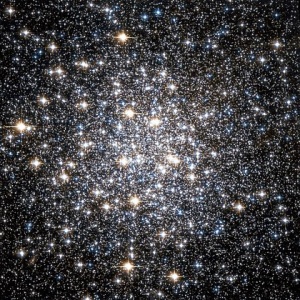Messier 10: Difference between revisions
Appearance
No edit summary |
No edit summary |
||
| Line 2: | Line 2: | ||
Messier 10 or M10 (also designated NGC 6254) is a globular cluster of stars in the equatorial constellation of [[Ophiuchus]]. The object was discovered by the French astronomer Charles Messier on May 29, 1764, who cataloged it as number 10 in his catalogue and described it as a "nebula without stars". | Messier 10 or M10 (also designated NGC 6254) is a globular cluster of stars in the equatorial constellation of [[Ophiuchus]]. The object was discovered by the French astronomer Charles Messier on May 29, 1764, who cataloged it as number 10 in his catalogue and described it as a "nebula without stars". | ||
The cluster is currently located about 5 kiloparsecs (16 kly) from the Galactic Center. | The cluster is currently located about 5 kiloparsecs (16 kly) from the Galactic Center. It completes an orbit around the Milky Way galaxy about every 140 million years, during which it crosses the plane of the galactic disk every 53 million years. | ||
Latest revision as of 22:54, 21 March 2015

Messier 10 or M10 (also designated NGC 6254) is a globular cluster of stars in the equatorial constellation of Ophiuchus. The object was discovered by the French astronomer Charles Messier on May 29, 1764, who cataloged it as number 10 in his catalogue and described it as a "nebula without stars". The cluster is currently located about 5 kiloparsecs (16 kly) from the Galactic Center. It completes an orbit around the Milky Way galaxy about every 140 million years, during which it crosses the plane of the galactic disk every 53 million years.
HGS Session References
HGS Sessions - Clearing Temple Mount, Jerusalem. - 3/20/2015 [1]
References
- ↑ HGS Session
Found in HGS Manual on Page 108 Found in HGS Manual on Page 115

